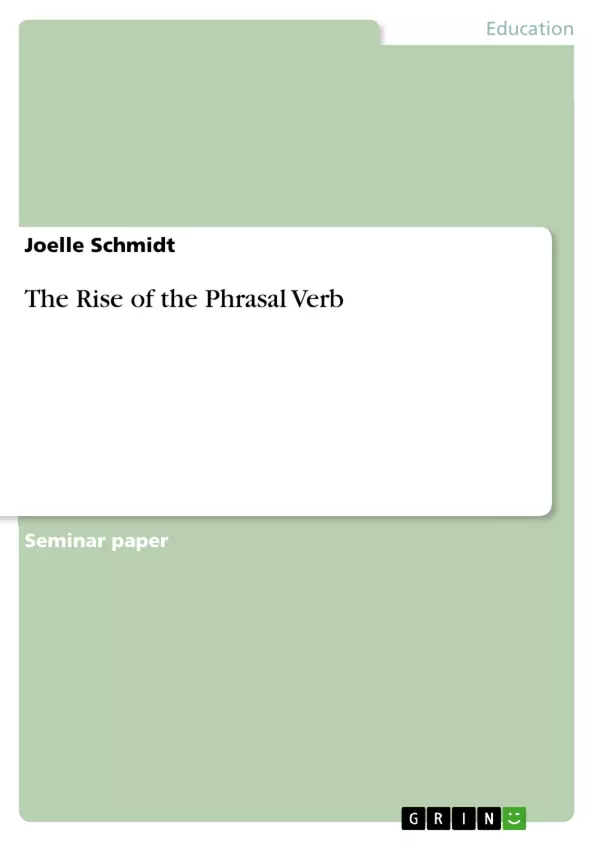Die Hausarbeit beschäftigt sich mit der Frage, weshalb dazu geraten wird in formellen Texten Wörter lateinischen Ursprungs anstelle von Phrasal verbs zu verwenden. Anhand der Geschichte des Phrasal verbs wird erklärt, wie es zu seiner schlechten Konnotation kam.
Table of Contents
- 1 Introduction
- 2 Research Method and Results
- 3 The Origin of the Phrasal Verb
- 4 Influence of Latinization on the Use of Phrasal verbs...
- 5 Conclusion
Objectives and Key Themes
This paper aims to investigate the historical development of phrasal verbs in English and explain the current preference for simple verbs in formal writing. It argues that this preference is rooted in a historical bias towards Latinate vocabulary over Germanic constructions.
- The origin and evolution of phrasal verbs in English.
- The changing word order and syntactic structure of phrasal verbs across different historical periods.
- The impact of Latinization on the perception and usage of phrasal verbs.
- The correlation between formality of text and frequency of phrasal verb usage.
- The historical development of phrasal verbs' negative connotation in academic writing.
Chapter Summaries
1 Introduction: This chapter introduces the topic by contrasting the advocacy for simpler language in public documents with the continued prevalence of Latinate simple verbs over Anglo-Saxon phrasal verbs in modern texts. It defines phrasal verbs and presents the central argument: the preference for simple verbs stems from a preference for Latinate over Germanic vocabulary. The chapter sets the stage for exploring the historical development of phrasal verbs' negative connotation.
2 Research Method and Results: This chapter details the research methodology used to investigate the frequency of phrasal verbs in formal versus informal texts. Data from three different corpora (the complete British National Corpus (BNC), BNC Law, Politics and Education, and BNC Unscripted Spoken Language) were analyzed and compared. A bar chart illustrates the significantly lower proportion of phrasal verbs in formal texts compared to informal speech, supporting the central argument of a preference for simple verbs in formal writing. The chapter concludes by stating the reason behind this disparity will be analyzed throughout the rest of the paper.
3 The Origin of the Phrasal Verb: This chapter traces the origin of phrasal verbs back to Old English (5th-12th centuries). It highlights that while the structure involved a verb and particle, the particle was a prefix, making the two inseparable. This differs from modern phrasal verbs where the particle is freely moveable. Examples from Old English are provided, illustrating the syntactic differences between Old and Modern English. The chapter notes that phrasal verbs weren't extensively used in Old English, and the decreasing stress on prefixed particles limited their productivity.
Keywords
Phrasal verbs, simple verbs, Latinization, Old English, Middle English, Early Modern English, Germanic, Latinate, corpus linguistics, formal language, informal language, word order, syntax, historical linguistics.
Frequently Asked Questions about: A Comprehensive Language Preview on Phrasal Verbs
What is the main topic of this language preview?
This preview explores the historical development of phrasal verbs in English and explains the current preference for simple verbs in formal writing. It argues that this preference is rooted in a historical bias towards Latinate vocabulary over Germanic constructions.
What are the key themes explored in this preview?
Key themes include the origin and evolution of phrasal verbs, the changing word order and syntactic structure of phrasal verbs across different historical periods, the impact of Latinization on their perception and usage, the correlation between text formality and phrasal verb frequency, and the historical development of phrasal verbs' negative connotation in academic writing.
What research methods were used?
The research involved analyzing data from three different corpora: the complete British National Corpus (BNC), BNC Law, Politics and Education, and BNC Unscripted Spoken Language. The analysis compared the frequency of phrasal verbs in formal versus informal texts.
What are the key findings?
The research found a significantly lower proportion of phrasal verbs in formal texts compared to informal speech, supporting the argument of a preference for simple verbs in formal writing. This disparity is explored throughout the preview.
How does the preview trace the origin of phrasal verbs?
The preview traces the origin of phrasal verbs back to Old English (5th-12th centuries), highlighting the differences between Old English phrasal verbs (where the particle was a prefix) and modern phrasal verbs (where the particle is freely moveable).
What is the role of Latinization in the use of phrasal verbs?
The preview argues that the preference for simple verbs in formal writing is linked to a historical bias towards Latinate vocabulary. Latinization influenced the perception and usage of phrasal verbs, leading to their decreased frequency in formal contexts.
What is the relationship between formality and the use of phrasal verbs?
The preview demonstrates a strong correlation between the formality of a text and the frequency of phrasal verb usage. Formal texts show significantly less use of phrasal verbs compared to informal texts.
What are the key chapters and their summaries?
The preview includes chapters on Introduction (setting the stage and defining the central argument), Research Method and Results (detailing the methodology and findings), The Origin of the Phrasal Verb (tracing the historical development), and a Conclusion (summarizing the findings and implications). Each chapter summary is provided within the preview.
What are the keywords associated with this preview?
Key words include phrasal verbs, simple verbs, Latinization, Old English, Middle English, Early Modern English, Germanic, Latinate, corpus linguistics, formal language, informal language, word order, syntax, and historical linguistics.
- Arbeit zitieren
- Joelle Schmidt (Autor:in), 2021, The Rise of the Phrasal Verb, München, GRIN Verlag, https://www.grin.com/document/1180221



